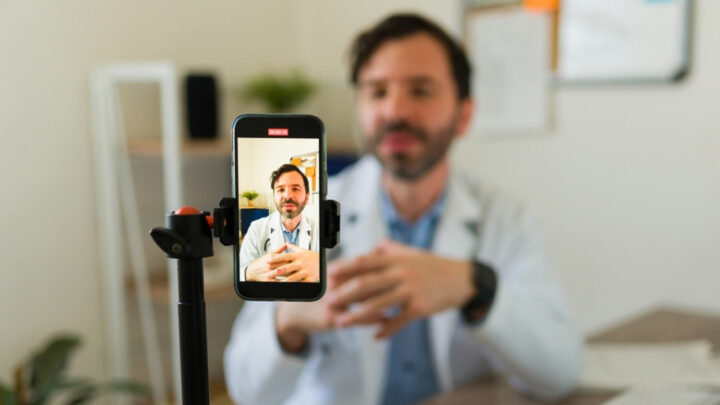
In a Sermo survey, 60% of doctors reported that personal branding has a positive impact on their careers.1
Physician personal branding involves creating a professional identity that showcases your expertise, values, and unique approach to care. By combining your clinical skills, reputation, and personality, you can build greater recognition among peers, patients, and the broader healthcare community.
Despite these advantages, 53% of physicians haven’t started building their brand, with 31% having no plans to do so.1
So, why have fewer than half of physicians begun to build a personal brand? What kinds of barriers have they come across? How can you overcome the challenges of creating your own? This article answers these questions.
Why doctor personal branding matters

Today, 94% of U.S. healthcare patients use online reviews to evaluate their doctor, underscoring the critical role of online reputation.2
Moreover, it’s not just patients that curating a clear online presence can positively affect: many doctors benefit from career advancement and greater awareness of their practice, too.
Career advancement
26% of doctors in a recent Sermo survey say personal branding has positively impacted both their career opportunities and patient care.1
A great example of a physician using their personal branding to gain opportunities is Dr. Atul Gawande, whose thought-provoking writing and captivating public speaking afforded him the opportunity to deliver a TED Talk3 and write for The New Yorker.4
Branding can provide you with a platform to showcase expertise, attract new opportunities and shape a professional legacy beyond your clinical practice.
Patient trust and relationships
Patient trust is a cornerstone of healthcare, and 14% of doctors report that branding has directly improved these relationships.1
An excellent case study of using an online brand to build trust is healthcare influencer Dr. Grunch (@ladyspinedoc). Her success in blending expertise with authenticity on TikTok5 and LinkedIn6 has earned her 2.3 million followers who describe her as “knowledgeable and kind.”
Much like Dr. Grunch, if you can find a way to deliver your specialist knowledge in an empathetic and engaging way, your brand will gain a reputation for compassion and competence, ultimately driving trust.
Thought leadership and influence
With 44% of patients valuing advice from health influencers and 98% trusting their insights,7 a strong personal brand is essential for establishing credibility to inspire patients and connect with peers.
Kevin Pho, M.D., founder of KevinMD.com, exemplifies this impact. His blog garners over 3 million monthly views and he has 250,000 Instagram followers, amplifying his voice as a thought leader.8
Personal branding extends your reach and positions you as an influencer who is able to create conversations and build trust throughout the medical field.
Effective strategies for building your physician brand

How to build a doctor’s personal brand
Effective personal branding combines two key elements: your personal values (what you stand for) and your healthcare practice (your unique medical skills).
By applying these elements to the core pillars — authority, authenticity, awareness and audience differentiation — you can create a lasting and impactful brand.
Authority: position yourself as a thought leader
“It is good practice to publish publications to disseminate medical information,9” shared a Sermo neurosurgeon, highlighting the importance of thought leadership in medicine to influence patients, peers and the broader healthcare community.
See what your peers are saying about personal branding in medicine by participating in our live Sermo poll and reading the full comments. If you’re not a member, sign up for free and click the link to go directly to the poll.
Building authority begins with showcasing your practice, achievements and innovative ideas on platforms such as blogs, medical journals and physician networks. All of these allow you to demonstrate your expertise and credibility in your field.
Physicians like Dr. Karan Rajan exemplify this approach. His 1.4 million Instagram followers benefit from his myth-busting health advice, proving that authoritative voices can educate and inspire beyond traditional settings.10
Authenticity: build genuine connections
“The best marketing is a good clinical and humanized practice,11” shared a Sermo endocrinologist, capturing authenticity’s importance in medicine. Authenticity lets patients see the person behind the expertise and gives them a feel for what their experience in your care will be like, fostering trust and a deeper connection.
You can make your brand authentic and relatable by sharing personal values and writing in a way that allows your compassion and personality to shine through. Storytelling is often the key and can be used to great effect when sharing patient success stories, behind-the-scenes glimpses, or “day in the life” content. For example, Mayo Clinic’s Sharing Mayo Clinic blog, featuring staff stories,12 exemplifies how authenticity builds trust.
As one obstetrics member reflected, “Marketing dehumanizes medical practice… but done professionally, it clears up doubts.11” Authenticity in your marketing can resonate deeply to build trust with your audience.
Awareness & visibility: expand your reach
“I spend about $350 per month [on Google Ads], and it gets maybe 300–350 hits on my site, with about 70% of them coming in,13” shared a Sermo hospital medicine physician, illustrating the power visibility brings through digital marketing for doctors. Awareness is about ensuring your expertise and practice remain accessible to patients and peers, making it easier for them to connect with you.
Digital presence is no longer optional. A Healthline Media Survey found that 95% of respondents either booked medical appointments online or would if the option were available.7 This emphasizes the importance of digital platforms in reaching patients.
Consider things like launching a personal or practice website, using social media and joining professional and patient-centric networks to remain discoverable. As one Sermo otolaryngologist noted, “We get quite a number of new patients outside our practice region directly attributable to our website. It’s a great investment.14”
By using digital tools, you can boost visibility, attract patients and solidify your credibility in your field.
Audience knowledge of your difference: stand out in your field
“When there has been a serious complication at birth, it has been a great boon to communication about difficult issues to have a relationship before the delivery,15” shared a Pediatry Sermo member on the topic of marketing, emphasizing the value of sharing your unique insights online.
Explaining your differentiation through your brand highlights what makes you unique and attracts patients who want the services only you offer. By showcasing innovative treatments, distinctive care approaches, or thought leadership, you build trust and stand out in a competitive field.
This strategy is about relevance as much as visibility. Tailored messaging ensures resonance with specific demographics. For instance, a knee arthroplasty specialist might focus on their experience with those aged 65+ or injured athletes. Getting your unique message in your public speaking, publishing research, or collaborating with local media further amplifies your distinction.
Sermo data reveals 26% of doctors credit branding with advancing their careers and patient care.1 Differentiation fosters trust, boosts credibility and leaves a lasting professional impact.
Networking and social media: key tools for personal branding

Networking remains one of the most effective tools for building a brand, with 35% of doctors believing it’s the best approach.1 So, what does good networking look like?
Social media
With 24% of doctors viewing social media as one of the most efficient ways of creating personal branding,1 it’s essential to establish a presence on platforms like LinkedIn, X (Twitter), Facebook and even TikTok. Regularly posting informative, professional content across these sites can enhance visibility and credibility.
Physician networks
Physician networks like Sermo give you a place to build your authority and visibility with your peers through discussions. In these networks, you can start conversations, see patient insights, respond to surveys and share case studies to establish yourself.
With 35% of doctors value connecting with other professionals to build referrals,1 places such as Sermo give you a way to build your brand while potentially gaining patients. As one Sermo member in physician medicine notes, “Word of mouth/direct referrals are way more important [than other marketing forms].16”
Identifying and overcoming challenges in personal branding
19% of doctors face significant challenges in building their brand, while 24% experience minor challenges.1 Common barriers include:
- Limited time
- Marketing knowledge gaps
- Concerns about HIPAA regulations
What can you use for support?
- Seek expert guidance and education: Partner with a digital marketing consultant or take targeted courses on personal branding and digital marketing.
- Get support from online networks: In the Sermo community, doctors exchange expertise, share experiences, and support one another in managing their professional reputations.
Why start now? What are the benefits of building a personal brand for healthcare professionals?

60% of doctors surveyed see their personal brand as having a positive impact on their careers, patient relationships, or both.1
Starting your personal branding now can help you to foster patient loyalty and opportunities and help to keep your practice in healthy business.
Join the Sermo Community to begin your personal brand
Building a personal brand doesn’t have to be a solo journey. By joining the Sermo healthcare community, you can gain access to tools, resources and peer support for beginning the creation of your personal and practice brand.
Footnotes
- Sermo poll: Physician Personal Branding
- Digitalis
- TED
- Atul Gawande
- TikTok
- Healthline Media
- KevinMD
- Sermo discussion: How do you use social media professionally?
- The Sun
- Sermo poll: Medical Marketing Practice
- Mayo Clinic
- Sermo discussion: Marketing a psychiatric private practice
- Sermo discussion: Marketing and advertising
- Sermo discussion: Any ideas for marketing a podiatry private practice?
- Sermo discussion: Marketing your practice














